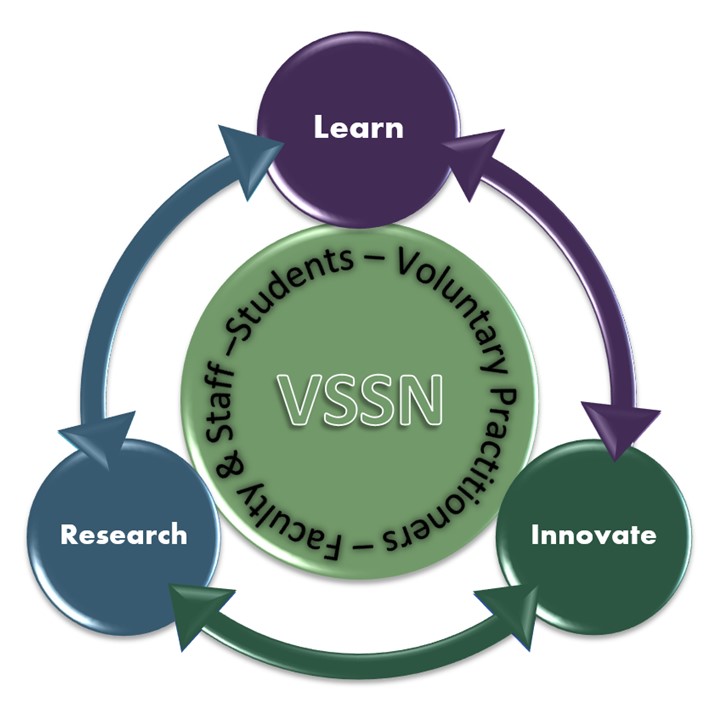
What is the NVSSN?
The Nonprofit & Voluntary Sector Studies Network (NVSSN) is a community-driven network made up of professionals from the nonprofit and voluntary sector, University of Regina students, faculty members, staff, and campus partners. Our mandate is to provide sector-driven learning and networking opportunities.
The Nonprofit and Volunteer Sector
The NVSSN strives to bring awareness and advocate for the third sector- also known as the nonprofit, community-based sector. The sector provides many public benefits, is woven into the the historical fabric of Canada, is active in myriad areas (e.g., arts/culture, heritage, environment, sports and recreation, faith-based organizations), has $75 billion in revenues, is found in every community, has thousands of staff, and draws on millions of volunteer hours every year. Saskatchewan has at least 8,000 registered charities and nonprofits, has the second highest number of voluntary organizations per capita in Canada and has the highest volunteer rate in Canada.
Who do we serve?
Through both formal and informal learning, the NVSSN strives to serve nonprofit sector leaders, U of R students, staff, and faculty members to build their professional knowledge and enhance the quality of life and wellbeing of all people in Saskatchewan.
NVSSN embraces three inter-related themes

The NVSSN program embraces three inter-related themes – learn, research, innovate. As shown in the figure to the right, students, voluntary sector staff and volunteers as well as university faculty/staff are involved in dynamic and mutually beneficial relationships while learning, researching and innovating. We believe that by enhancing connections among these diverse groups that the potential for reciprocal learning for everyone involved is great – indeed, the creation and sharing of knowledge is multi-directional. This reciprocal learning benefits communities and society as a whole.
Learning at NVSSN is both formal and informal and encompasses different models of course delivery: semester-long courses, online courses, webinars, block classes, evening seminars and ‘weekend university’. There are three main groups of learners at NVSSN:
- Academic courses for undergraduate students who may be interested in studying the voluntary sector – Based on a review of curricular guidelines and analyses of data collected during our first year, a selection of courses currently offered on campus are being and adapted to incorporate a “community-engaged learning” and new courses are being designed at the undergraduate level for a proposed certificate.
- Professional development for voluntary sector staff and volunteers – new learning opportunities are being developed for voluntary sector staff (e.g., senior, middle and front-line staff) and volunteers. While there are some training programs currently in place, the HR Council for the Nonprofit Sector in Canada found problems with numerous courses (e.g., there were very few hands-on components). We are currently identifying what gaps exist and discerning how to fill them.
- Professional development for faculty – through peer-mentorship, faculty are given opportunities to learn how to build experiential learning activities into their courses as well as learn about community-engaged scholarship.
Community-based participatory action research and community-engaged scholarship are the main paradigms at NVSSN. Community-engaged scholarship is a multi-dimensional, systematic, documented and evaluated process of discovery that is entrenched in both theoretical literature and the real-world that results in products that are public, peer-reviewed, change-oriented and made available to others for further use. These products range from theories about the sector, new legislation and public policies, to community histories and children’s drawings. Depending on the nature of the projects, teams of students engage in community-based research and work closely with faculty and voluntary organization staff and volunteers. The integration of theory and practice is paramount.
Innovation is an essential component because the voluntary sector is undergoing transformational shifts today (e.g., shifts in the charity, social justice, and social enterprise models) yet Canadian research on the voluntary sector is still in its infancy. Complexity, network and ecological theories – to name but three key theories – inform our work. We believe when a diverse group of thinkers – old and young, experienced and inexperienced – sit and dialogue around the same table, new ways of looking at problems and their resolution ensue. Students will develop their leadership skills and voluntary entrepreneurship skills; new public policies and voluntary sector incubators are but two examples of what students can pursue at NVSSN.
Want to stay connected to NVSSN?
Sign up to be part of our mailing list!
Supported by:


